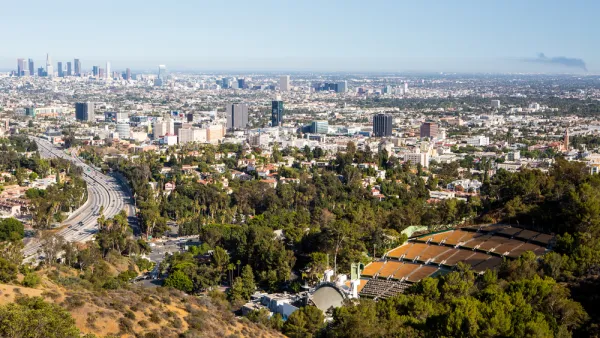Despite years of community engagement, political discussion, and planning, the city of Los Angeles has struggled to pass updated community plans, and in many neighborhoods, developments may suffer through years of litigation and bureaucracy.
The Westside Urban Forum, a networking organization dedicated to the land-use dialogue impacting Los Angeles’ Westside, hosted a May panel, “The Art of Getting to Maybe: Why has Updating LA’s Community Plans become Impossible?” examining the failure of the Hollywood Community Plan. Despite years of community engagement, the plan was challenged by community groups, thrown out by a judge, and repealed by the Los Angeles City Council in compliance with a court order. Moderated by Michael Woo, Dean of the College of Environmental Design, Cal Poly Pomona and former Los Angeles City Councilmember representing Hollywood, the panelists—Jane Usher, former Senior Assistant City Attorney and Planning Commission President; Dale Goldsmith, Partner, Armbruster, Goldsmith & Delvac; and Tom Donovan, West Los Angeles Area Planning Commissioner and Attorney—answer the “Why” question, citing a lack of political will behind community plans and the uniqueness of Hollywood.
Los Angeles' Community Plans are supposed to be updated on a regulate basis. The lack of support behind planning at the City Council and in neighborhoods, however, can severely slow down the process. With the Hollywood Community Plan now void, planners and developers must rely on the 1988 plan and the Los Angeles City Council for direction and approval.
The Planning Report shares the following excerpts from the Forum, focusing on how things operated in City Hall and whether Angelenos believe in real planning. Panelists agree that the scale of the geographic and social diversity of Los Angeles makes uniting constituents behind a common vision particularly challenging for City Councilmembers and officials. As Dale Goldsmith notes: "It is certainly a question of political will. If the city council was really focused on getting the plans up to date, I think you’d see a lot more progress. But keep in mind that Los Angeles is a vast city. Mike, when you were a city councilmember you had more constituents than a Senator in Wyoming. And you have huge geographic variation, even with some of the 35 community plans. Hollywood, for example, has hillsides, dense urban areas, and ethnic neighborhoods—I think that makes the planning process a lot more difficult. I agree with your professor that LA is different and harder because of the scale. Size does matter in planning."
FULL STORY: Mike Woo Moderates WUF Panel: The Impossibility of Updating City of LA’s Community Plans

Analysis: Cybertruck Fatality Rate Far Exceeds That of Ford Pinto
The Tesla Cybertruck was recalled seven times last year.

National Parks Layoffs Will Cause Communities to Lose Billions
Thousands of essential park workers were laid off this week, just before the busy spring break season.

Retro-silient?: America’s First “Eco-burb,” The Woodlands Turns 50
A master-planned community north of Houston offers lessons on green infrastructure and resilient design, but falls short of its founder’s lofty affordability and walkability goals.

Test News Post 1
This is a summary

Analysis: Cybertruck Fatality Rate Far Exceeds That of Ford Pinto
The Tesla Cybertruck was recalled seven times last year.

Test News Headline 46
Test for the image on the front page.
Urban Design for Planners 1: Software Tools
This six-course series explores essential urban design concepts using open source software and equips planners with the tools they need to participate fully in the urban design process.
Planning for Universal Design
Learn the tools for implementing Universal Design in planning regulations.
EMC Planning Group, Inc.
Planetizen
Planetizen
Mpact (formerly Rail~Volution)
Great Falls Development Authority, Inc.
HUDs Office of Policy Development and Research
NYU Wagner Graduate School of Public Service




























